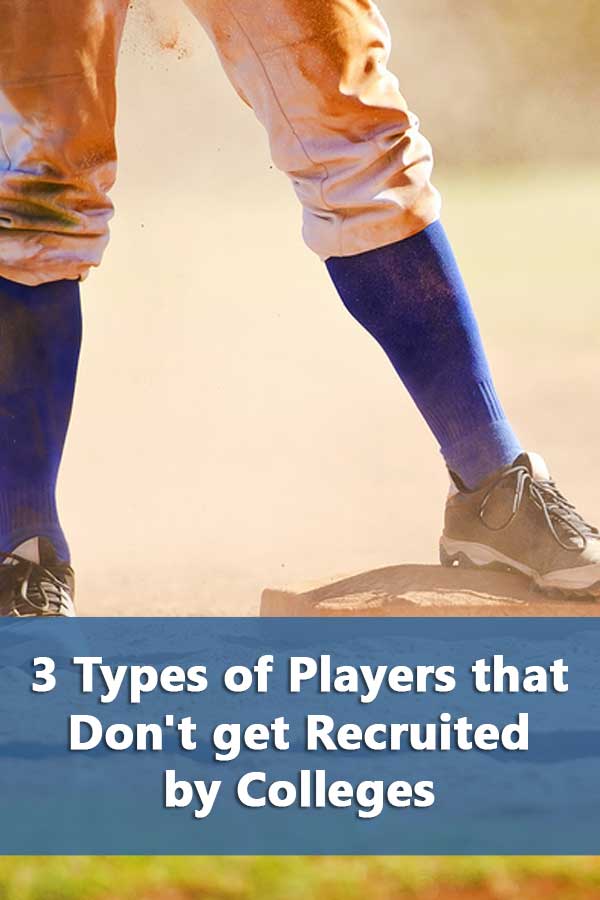 There are a lot of athletes and their families that are expecting to play their sport in college. And far too many of them are actually counting on an athletic scholarship as part of their plan to pay for college. Yet, the truth is that most of these players won’t be recruited to play in college, much less get a scholarship because they make common recruiting mistakes. If you’re one of the following types of players, chances are you won’t be playing in college.
There are a lot of athletes and their families that are expecting to play their sport in college. And far too many of them are actually counting on an athletic scholarship as part of their plan to pay for college. Yet, the truth is that most of these players won’t be recruited to play in college, much less get a scholarship because they make common recruiting mistakes. If you’re one of the following types of players, chances are you won’t be playing in college.
| FREE Course on How to Start Profiling a College Enroll Now! |
1. Players who think coaches will contact them.
It’s easy for athletes to make the common recruiting mistake that college coaches will be contacting them and they just need to wait for the offers to come rolling in. After all, every week there seems to be another story about some eighth grader committing to a nationally ranked football program or a softball player trying to decide which college to go to when she isn’t even old enough to get a learner’s permit.
However, this is not normal for most athletes. Unless you’re a blue-chip athlete who regularly makes national lists of the top 100 recruits for your sport, you’re going to need to contact coaches if you want to be recruited.
Just take a few minutes to think about it. If you aren’t a top 100 athlete, how is a coach going to find out about you? They don’t have the budget or the staff to scout every high school game in the country. And don’t mistake an invitation to attend a college prospect camp as a sign that you’re being recruited. Unless the coach has clicked on your video or sent you an email that doesn’t ask you to pay for something, just treat the invitation as just the result of a mass email campaign.
Even when coaches attend tournaments or prospect camps/combines, they generally already have specific athletes they intend to follow. They aren’t going to waste their time and money attending an event where they hope they might stumble across some viable prospects.
This means that players need to contact coaches to let them know they exist. Because planning on hitting a home run and hoping a coach will notice at a prospect camp is just a good way to waste money.
2. Players who think their athletic ability will make up for poor grades.
Players with low academic credentials who are counting on their athletic accomplishments getting them into college are making a very common recruiting mistake that can be hard to recover from. The reality is that colleges require athletes to take college classes and pass them.
Furthermore, coaches don’t have the ability to decide to overlook academic shortcomings to put a great athlete on the team. There are minimum standards set by the NCAA and NAIA that students have to meet if they want to be eligible for an athletic scholarship. If you can’t even meet the minimum requirements, coaches aren’t going to bother with you.
As for those who just manage to meet the minimum requirements? Just how much time and energy do you think coaches want to devote to making sure an athlete stays eligible to play?
Go visit the college websites you’re interested in and see how many college freshman are actually starting. Do you really think your athletic skills are so needed on the team that the coach is willing to take on a player with questionable academic discipline?
3. Players who have an unrealistic view of their own abilities.
Ultimately, the one recruiting mistake that most high school athletes make which results in not playing in college is that they think they’re better than they actually are. This is basically the root of the two problems I just discussed. Players think they are so good, they will be noticed or that they don’t have to worry about grades.
You have to have a realistic view of your own abilities so that you contact coaches that are interested in recruiting you. What people tend to forget is that while everyone hears about the top college programs in the country, most college athletes play at the lower divisions. In fact, the largest division in college athletics, NCAA D3, doesn’t even offer athletic scholarships.
Yet, too many athletes ignore the lower divisions until they realize they’re seniors without any college offers. By then, the smarter players who understood their talent made them better suited for D2 colleges, have the edge in the competition for the more limited number of D2 scholarships. Or those who targeted D3 schools worked on their grades and test scores to take advantage of the academic scholarships offered by D3 schools.
If you want to play at the college level, you need to make it as easy as possible for coaches to recruit you. This means athletes need to contact coaches of teams that match their abilities and have an academic record that demonstrates they won’t be an academic liability to the team.
CONNECT WITH OTHER PARENTS WITH PROSPECTIVE COLLEGE ATHLETES
JOIN THE COLLEGE RECRUITING PARENT ZONE



2 thoughts on “3 Types of Players that Don’t get Recruited by Colleges”